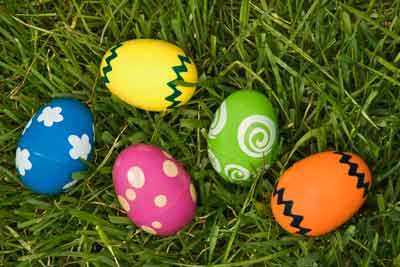(单词翻译:单击)
情景对话
Easter is a holiday celebrated in March on the Sunday after the full moon, or on the Sunday after the first day of spring which I think is March 23rd. So it would be the Sunday after March 23rd.
复活节是在三月满月后的周日庆祝的节日,或者说是在春分之后的周日,我想春分是在3月23日。所以复活节是在3月23日之后的周日。
Easter is a Christian holiday celebrating the resurrection of Jesus Christ. That means the rebirth of Jesus Christ, when he was born again after his death. If you ask children, however, what Easter is all about, they will say that it is about Easter eggs and the Easter bunny. It's interesting this tradition comes from a non-Christian source.
复活节是基督教庆祝耶稣基督复活的节日。耶稣基督复活指耶稣在死后重生。如果你问孩子们什么是复活节,他们会说是和复活节彩蛋和复活节兔子有关的节日。有意思的是这个传统的起源是非基督教的。
A long time ago when non-Christians would celebrate the springtime, there is a story of a bird who had a broken wing and a magician turned him into a rabbit so he would be able to survive the winter better. And this rabbit was still able to lay eggs like a bird. So now they celebrate the Easter Bunny during springtime and we—children paint eggs and adults hide them and the children have to go find the eggs and put them in their Easter basket.
很久以前,非基督教人士会庆祝春令,有一个有关鸟的故事,有一只鸟翅膀受伤了,而一个魔术师把这只鸟变成了兔子,这样它就能更顺利地熬过冬天。而这只兔子还能像鸟一样下蛋。所以现在他们会在春令时分庆祝复活节兔子,而我们孩子就会在蛋上绘画,成年人会把这些蛋藏起来,让孩子们去找彩蛋,找到后放进复活节篮子里。

重点讲解
重点讲解:
1. come from
来自;始于;
eg. Nothing but disaster would come from such a plan.
此一计划除了导致失败而外将一无所获。
eg. Many idioms, for instance, come from favorite traditional British activities such as fighting, sailing and hunting.
譬如,很多成语起源于英国人钟爱的传统活动,如搏斗、航海和狩猎。
2. a long time ago
很久以前;
eg. I'm afraid I can't remember, it was such a long time ago.
很抱歉,我想不起来了--那是很久以前的事了。
eg. A long time ago, in between the birds and beasts have taken place in a war.
很久以前,在鸟和兽之间发生了一场战争。
3. turn into
(使)变成;(使)成为;
eg. A prince turns into a frog in this cartoon fairytale.
在这个卡通童话里王子变成了一只青蛙。
eg. He soon turned his dreams to reality.
他不久便梦想成真了。


